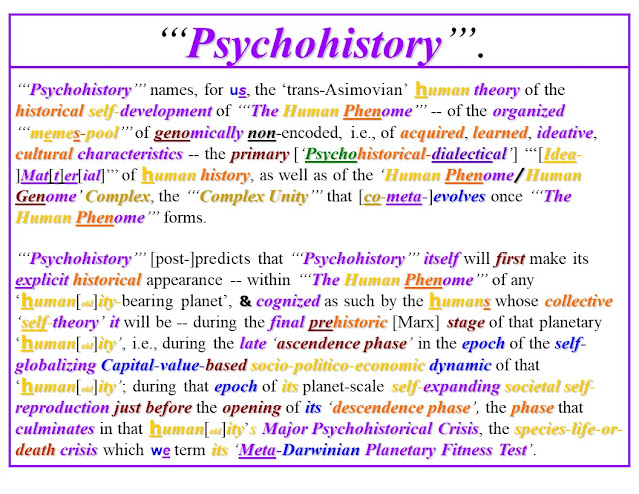Internet Dialogue on Psychohistory, Asimovian [fictional] versus Actual.
Dear Readers,
In response to a recent blog entry by Venkatesh Rao, entitled "Prolegomena to Any Dark_Age Psychohistory" --
https://www.ribbonfarm.com/2017/11/30/prolegomena-to-any-dark-age-psychohistory/#comment-270810
-- I wrote the following:
First, let me say that I celebrate both the vast but
integrating scope of your discourse, and the ‘lyricality’ of its delivery!
There is an opus of which you may not be aware, but might
wish to integrate parts of, into your own world vision.
This opus is also deeply engaged with, and deeply inspired
by, the Asimovian Foundation mythos.
This opus involves very specific definitions of both the
term “Dark Age” and the term “[Global] Renaissance” --
It authors also weave their discourse in the dialectic of
memes and genes -- in that of what they call ‘The Human Phenome’ in
co-evolution with “The Human Genome” --
Indeed, applying their discovery of a breakout into new
mathematical territory, involving a ‘contra-Boolean’ algebra of logic which is
grounded in a “non-standard model of the Natural numbers”, they have derived a
system of seven simultaneous ‘psychohistorical-dialectical meta-equations’
--
-- which focus upon a newly-discovered tractable core within
the turbulence of human history, including one ‘meta-equation’ that directly
addresses the ‘Human Phenome’/”Human Genome” complex unity.
Their mathematical breakout also has something to say about
the supposedly “unsolvable, in closed-form” nonlinear partial
integro-differential equations in which most of our best to-date formulations
of the “laws” of Nature are expressed, linking that “unsolvability” to the
[locally] “unsolvable diophantine equations” into which the expressions
implying “Gödel Incompleteness” of mathematical axioms-systems “deformalize”,
marking the boundaries between one axiomatic system of arithmetic and its
next-higher successor-system in the “incompletable” [Gödel] progression of
ever-richer systems of mathematical language.
That breakout has something to say about mathematical “singularity”
-- about the finite time divisions by zero that plague especially nonlinear
differential equations --
And it has something to say about new kinds of
“transcendental functions” that may solve nonlinear differential equations in a
new kind of “closed, analytical form”.
Finally, their opus involves a programme for averting the
‘New/Final Dark Age’ upon which we are now verging --
-- and a new institutional design --
SOLUTION –
‘Equitist Political-ECONOMIC
DEMOCRACY’;
BOOK:
THE MISSING BLUEPRINTS
Free of Charge Download
of Book PDF --
http://www.dialectics.info/dialectics/Applications.html
Hardcover Book Order --
-- supporting a new “sentiment superstate” of ‘Global
Renaissance’ and of human flowering, ‘planetary polis’ and beyond.
The authors of this opus are strong, to my reading, in the
area of what might be called ‘collective-cognitive psychohistory’, but they are
not so strong where I find your discourse to excel the most: in the area of what might be called
‘collective-affective psychohistory’.
Perhaps there could be some “complementarity”?
Regards,
Miguel








No comments:
Post a Comment